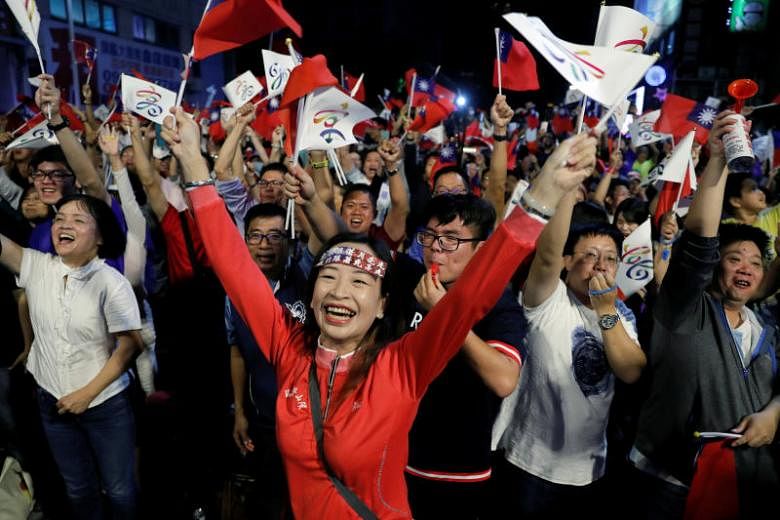The drubbing that Taiwan's ruling Democratic Progressive Party (DPP) took in Saturday's local elections shows that the Taiwanese reject President Tsai Ing-wen's separatist policies, said a Chinese official, an interpretation echoed by Chinese state media.
But some Chinese experts said the polls focused on bread-and-butter issues and the results do not show a shift in sentiment towards reunification with the mainland.
The DPP, which held 13 of Taiwan's 22 mayoral seats before the polls, hung on to just six while its China-friendly rival Kuomintang (KMT) won a total of 15. Independent candidate Ko Wen-je was re-elected as Taipei mayor.
"The poll's results reflected the strong will of Taiwan's general public to continue to share in the benefits of the peaceful development in cross-strait relations, and their hopes to improve the economy and living standards," China's Taiwan Affairs Office spokesman Ma Xiaoguang said yesterday.
He said China will continue to uphold the 1992 Consensus - that there is only one China, open to different interpretations - and Beijing would "resolutely oppose separatist elements advocating 'Taiwan independence' and their activities".
Beijing suspended official exchanges with the island in 2016 after Ms Tsai did not reaffirm the 1992 Consensus and accept the one-China principle after becoming Taiwan's President.
Cross-strait ties, which had warmed up when the KMT's Mr Ma Ying-jeou was president, have taken a dive in the last two years. China has stepped up military exercises in the Taiwan Strait, and put in measures to inflict economic pain on the island, such as restricting the flow of mainland tourists.
Yesterday, Mr Ma Xiaoguang added that China wants to enhance exchanges and cooperation between Taiwan's counties and cities and their mainland counterparts, but "on the basis of correct understanding of the nature of cross-strait relations".
His comments earned a swift rebuttal yesterday from Taiwan's Mainland Affairs Council, which said the Chinese Communist Party should respect Taiwan's internal affairs, or risk damaging the future of cross-strait ties.
"Our policy position has not changed... Only communication and exchange without political preconditions will resolve differences and lead to a breakthrough for both sides," it said in a statement.
Yesterday, a commentary in the Global Times, a nationalistic tabloid, said that while Ms Tsai's two predecessors suffered defeats in local elections in their second terms, the DPP's losses after just two years "show that Tsai Ing-wen's is the lousiest administration since Taiwan began competitive elections".
The DPP's tried-and-tested tactic of scoring political points by exploiting cross-strait issues was no longer effective, it added.
Meanwhile, the official China Daily said in an editorial that Ms Tsai had her "abortive reforms of public policies" and refusal to recognise the one-China principle to blame for the DPP's poor showing.
"The Tsai administration's pro-independence secessionism has not only soured its crucial relations with the Chinese mainland, but also made it unpopular on either side."
But Chinese experts said cross-strait issues did not figure much in the polls.
Professor Jin Canrong from Renmin University said election campaigning focused on bread-and-butter issues such as the economy, and one notable trend was greater personalisation in Taiwanese politics, where people voted more for individuals instead of along party lines.
Such was the case for KMT mayoral candidate Han Kuo-yu, who took DPP stronghold Kaohsiung, he told Guancha.cn, a news portal. One revelation from this election is that the importance of ideology is fading among the young, he said. Whichever party can attract the young will have a brighter future, he added.
Taiwan watcher Li Yi of Renmin University agreed, noting that candidates like Mr Han had largely steered clear of cross-strait ties, with the KMT's China-friendly policies seen as a factor behind its loss in the 2016 elections.
If anything, Saturday's election results showed that pro-reunification forces continue to lose traction, he told The Straits Times.
"The people of Taiwan may not want reunification - and the number who want independence may actually be growing - but they have made it clear that Tsai has been naive to think that that means they don't want to do business with the mainland," he said.

